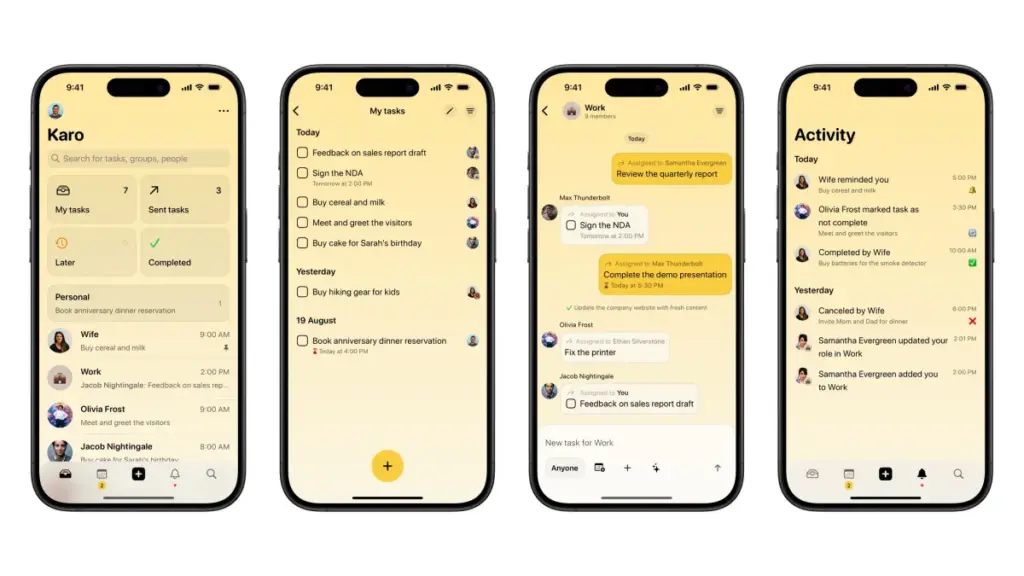The objective of the iOS application Karo, which translates to “do it” in Hindi, is to resolve the issue regardless of whether the other individual utilizes the application
You can construct a reminder and task management system for yourself and utilize a service suitable for your team. However, convincing your family members or acquaintances to utilize the same task management application may be challenging.
This is not the initial task management product developed by Mustafa Yusuf. The developer, based in India, also creates a to-do app called Tasks, designed for more intricate task administration. Yusuf disclosed to TechCrunch that Karo was created due to the inability of other applications to accommodate the assignment of duties to individuals in one’s address book.
“I could not delegate and monitor tasks for individuals in my contacts using any application.” For instance, my accountant, sister, contractor, or electrician. I wish to send them a task, which they will receive on the applications they currently use (e.g., WhatsApp/Messages), and I will receive a notification when they complete it. “If they do not, I would prefer the app to send automatic reminders instead of me nagging them,” he stated.
Yusuf stated that he was required to manually remind them to complete an assignment through WhatsApp or other chat applications before he created the app. Additionally, he could not recall his responsibilities due to the absence of a monitoring system

The Application and its Capabilities
Karo provides a user-friendly interface that resembles a messaging app conversation, enabling users to input duties effortlessly. The app recognizes identifiers, such as “tomorrow” and “10 am,” allowing users to add assignments using natural language.
The system will generate a task with a deadline if a specific time and date are specified. Additionally, you have the option to @mention a specific individual to designate them a task. As an alternative, icons can add a contact, date, and time to a task.
Users can append an image, a video, a PDF document, or a voice note to a task. Additionally, the year 2024 introduces an AI component. Users can utilize Karo AI to deconstruct larger duties into smaller ones. They can also request assistance from AI in organizing an excursion and compiling a list of tasks.
Once an individual is assigned a duty, they will receive a notification on Karo if they have the app. Alternatively, the application initiates a WhatsApp conversation with the user, and if that is unsuccessful, it sends a text message reminder. The individual receives a reminder for scheduled duties on the due date and two and four days after the due date. The app sends a reminder for non-scheduled duties two, four, and six days after the task is created.
Tasks are organized by contact on the primary interface. A conversation interface is initiated by tapping on an individual’s name, allowing you to view previous assignments and add new ones. The app also includes an activity tab that displays updates regarding all duties you are currently engaged in.
Although teams and minor organizations may employ dedicated task management solutions, numerous businesses in India lack a suitable system. They prefer to manage duties directly in WhatsApp groups. Yusuf believes that WhatsApp users will be attracted to Karo’s integration with the platform and its capacity to establish groups within the application.
He mentioned that certain companies are already using the app. For example, Karo is implemented by a dry fruit distributor in Mumbai to allocate packaging and delivery obligations to their personnel. Team members verify tasks via WhatsApp. Yusuf also mentioned that this could benefit book societies or study groups.
Karo is accessible for free; however, using features such as themes, groups, and attachments necessitates payment. Initially, the app was priced at $4.99 per month, $39.99 per year, and $99.99 for lifetime access. All plans offered introductory launch offers.
Yusuf intends to provide consumers with an Android version in the near future. But he believes that the primary appeal of the app is the capacity to send reminders to your contacts without them being on the app, even if they do not use it.contractual obligations.”
